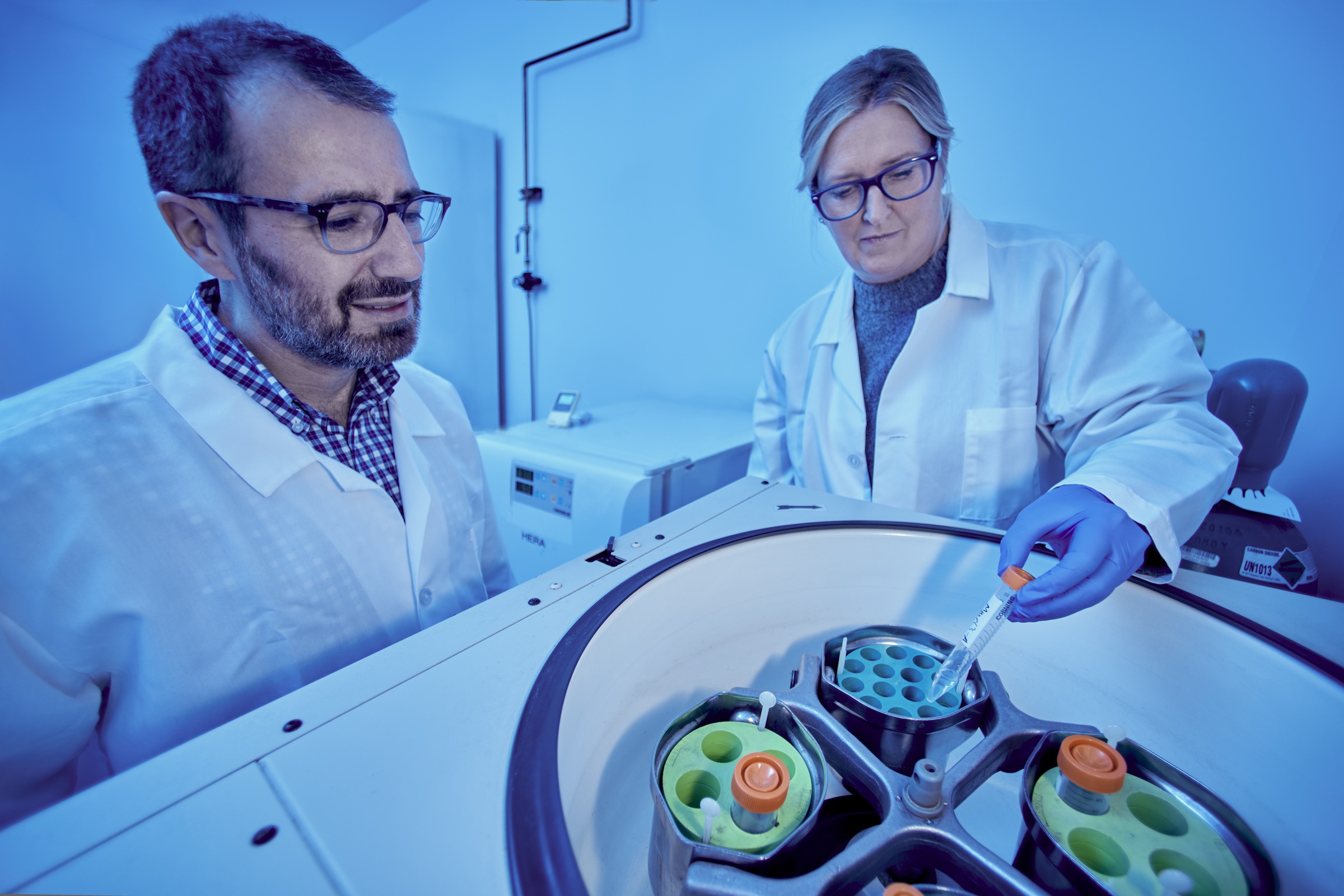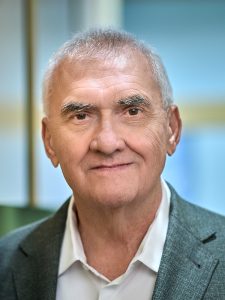New therapeutics represent important new breakthrough to treat drug-susceptible and drug-resistant strains of TB and change people’s lives.
“Dr. Abramovitch’s passion is not only to do tuberculosis research, but to drive that forward, to be a cause of change in the world,” says Frank Urban, Director of Venture Creation for Life Sciences at the Michigan State University (MSU) Research Foundation’s venture studio, Spartan Innovations.
Urban is speaking of Dr. Rob Abramovitch, Associate Professor, MSU College of Veterinary Medicine, and researcher into new therapeutics for treating mycobacterial infections. Abramovitch’s newly formed MSU startup, Tarn Biosciences, based in East Lansing, Mich., is developing therapies for tuberculosis (TB), nontuberculous mycobacterium (NTM) and other mycobacterial infections.
According to the Centers for Disease Control, TB is the greatest killer from infectious disease in the world, causing approximately 1.5 million deaths per year.
“Current antibiotic treatments work slowly, with treatment times lasting at least 6 months, with no guarantee of cure, and with harsh drug side effects,” says Dr. Abramovitch. “If the TB is drug resistant, it can take more than two years to treat, with worse side effects. TB has a 40 percent mortality rate, even with treatment.” Because of these long treatment timelines patient adherence to therapy is often quite low, contributing to the high mortality and morbidity of the disease.
Transferring the technology
Abramovitch’s research began more than ten years ago with attempts to identify therapeutic targets for intervention in TB. “We screened through about a million compounds for agents that modulate mycobacterium tuberculosis biology, and got some interesting lead compounds,” he said.
MSU’s goal is to move technologies from the lab to the marketplace. Anupam Jhingran, Technology Manager with MSU Technologies (MSUT), explains: “My role is to assist our faculty inventors in securing appropriate funds to develop the technology and to file patents to secure the intellectual property rights around the technology.” In August of 2022, to bolster the commercial potential of the technology, the Abramovitch lab was awarded an ADVANCE grant which supported chemistry and in- vivo validation studies. “We are grateful to have access to programs such as ADVANCE which has supported several of our promising projects. ADVANCE is co- funded by the Michigan Strategic fund and administered by the Michigan Economic Development Corporation” says Jhingran. Jhingran also facilitated signing of the June 2023 option agreement between Tarn Biosciences and the University which grants Tarn Biosciences a limited license to MSU’s intellectual property for further development, and the first right to negotiate an exclusive license for future commercialization.
Tarn was formed out of the collaboration between Abramovitch, MSUT and Spartan Innovations. In the spring of 2021, Spartan Innovations brought medicinal chemist, Dr. Edmund Ellsworth, and Entrepreneur-In- Residence Jim Vrbanac, Ph.D., to the project.
“The idea was to take the research and find a way to commercialize our discoveries,” says Abramovitch. “To do that, we needed to do a lot more chemistry and commercial development. So, we brought Edmund on, who’s been a core member of our team, who provides leadership and knowledge about medicinal chemistry, pharmacokinetics, and drug development.” Vrbanac and Ellsworth became equity owners of Tarn with Abramovitch in September 2022. Vrbanac now fills the role of Tarn’s CEO’.

The journey through drug discovery
Dr. Edmund Ellsworth, Professor, MSU Department of Pharmacology and Toxicology has more than 30 years of experience as a synthetic, organometallic, and medicinal chemist supporting translation from early drug discovery to development. With many years of corporate experience behind him, he is a scientist and a recognized leader in the drug development process with a clear understanding of the steps and practices involved in transforming an early chemical lead into a viable drug candidate. “Drug discovery is a long journey that can take years,” says Dr. Ellsworth. “It typically starts out in a lab, where molecular targets are identified then further explored as therapeutic targets for intervention in one disease or another. At Tarn, we have landed on two therapeutic focuses: one is TB, which has a global impact. The other is NTM, or non-tuberculous mycobacterium infection, which is an emerging disease in the U.S., Japan and parts of Europe.”
Abramovitch explains: “NTM infections tend to appear in immunocompromised patients and the prevalence and incidence has consistently increased at approximately 8% a year in affected areas.” In the U.S. prevalence of NTM infections is growing mostly in the south and along the coasts. Some strains, because of antibiotic resistance, are almost incurable. Based on this growth there is a serious need for new therapeutics.
The MSU scientists have worked on two targets that Tarn is moving towards investigational new drug studies (IND). For both, Tarn expects them to be effective for the treatment of TB and NTM infections alike.
“These drugs will represent important new therapies to treat drug-susceptible and drug-resistant strains of TB,” says Abramovitch. “We expect a result to be shorter drug treatment regimens.”
Funding enables more development
Tarn’s initial funding came through the MSU Research Foundation’s venture investment arm, Red Cedar Ventures. A total of $30,000 has been invested in the company to date.
In September of this year, Tarn was awarded a Small Business Technology Transfer (STTR) grant from the National Institutes of Health (NIH). The STTR, in addition to $25,000 from the Michigan Emerging Technologies Fund (ETF) position Tarn to further de-risk the technology with non-dilutive capital that could attract venture capital or strategic investors.
“I really feel now that I’m at Tarn, we can make solutions; we can help solve this problem. That’s what motivates me every day.”
— DR. ROB ABRAMOVITCH, Associate Professor, MSU College of Veterinary Medicine

“Until this STTR came through, all of the financial support was coming through Red Cedar Ventures. Now we have independent support for the company through the NIH,” he says.
Phase two funding, which also will come through NIH, is expected to more than double the previous funding. Notes Urban: “Transition to that kind of funding will be the next level and put them in a really strong position to do an investment, probably near the end of a Phase II STTR.”
“One of my most important jobs right now is investor relations,” says Vrbanac. “I’ll do a lot of presenting to potential investors now, so that down the road, when we have some really great data for one of our compounds, I’ll already have a ready list of interested investors to go to for next-phase funding. Having more than one party interested in your Intellectual Property (IP) certainly does increase the value of the IP.”
Building strong drug discovery facilities
“Until this STTR came through, all of the financial support was coming through Red Cedar Ventures. Now we have independent support for the company through the NIH.”
— JIM VRBANAC, PH.D., CEO, Tarn Biosciences

“When I started here in 2013, MSU didn’t have as robust a drug development capacity as we do now. Then they began an effort to build a drug discovery core. They built screening facilities; they hired an administrator to build and provide medicinal chemistry capabilities at MSU, and along with the Core In Vivo Facility, which does pharmacokinetics, they’ve built the capacity to do drug discovery and drug development in the academic environment,” says Abramovitch, adding, “They’ve built an infrastructure to provide seed money to launch the research. That allows scientists with key early data and IP to seek other grants to drive the research forward, and then hopefully discover something that could move ahead to continued preclinical development.”
“Molecular Discovery Grants (MDG) are a key early resource to support Drug Discovery at MSU” says Charles Hasemann, Associate VP for Innovation and Economic Development at MSU. “These grants are made possible by funds coming from the MSU Innovation Center and colleges whose faculty engage in drug discovery projects. These grants target the earliest stages of drug discovery projects at MSU, and get faculty engaged with the drug discovery support mechanisms that MSU has built in the past decade. MDG funding helped Abramovitch develop the earliest leads that eventually built confidence to launch Tarn.”
From lab to startup
“At Tarn, we have landed on two therapeutic focuses: one is TB, which has a global impact. The other is NTM, or non-tuberculous mycobacterium infection, which is an emerging disease in the U.S., Japan and parts of Europe.”
— DR. EDMUND ELLSWORTH, Professor, MSU Department of Pharmacology and Toxicology

The entire process enables much more than a lifetime of research. It allows faculty at MSU to be a part of bringing new technologies and therapeutics with the power to change peoples’ lives into the global marketplace.
“I’m an academic researcher, right?” says Abramovitch. “When I started here, I didn’t think I’d ever be starting a business.”
“My Ph.D. was in plant diseases,” he continues. “And when I was looking for what I was going to do for the rest of my career I felt a need to work on something that would impact global health. I saw that tuberculosis was this grand challenge in infectious disease and public health that needed more science to come to a solution.”
“I thought I could dedicate my career to this, and I became a TB researcher. And since then, every day I’m motivated to get up and go to work because I realize that it’s this huge problem that needs a solution.”
“I really feel now that I’m at Tarn, we can make solutions; we can help solve this problem. That’s what motivates me every day.”


